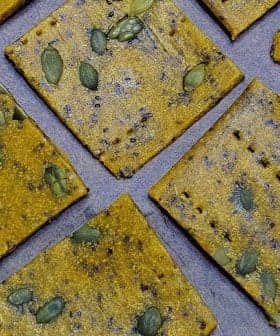 8.1K reads
8.1K readsHealth
Polyphenol in Extra Virgin Olive Oil May Shield Kidneys from Diabetes-Related Damage, Study Finds
A team from the Málaga Biomedical Research Institute and University of Málaga studied the potential of a trace polyphenol in extra virgin olive oil to protect against kidney damage in type 1 diabetes, which is a common complication of the disease that leads to chronic kidney disease worldwide. The researchers found that this polyphenol, DHPG, showed promising nephroprotective effects in rodent models of type 1 diabetes, reducing protein excretion in urine, increasing creatinine clearance, and lessening glomerular damage, suggesting a potential new approach to managing diabetic nephropathy.
In the first study of its kind, a team from the Málaga Biomedical Research Institute and Nanomedicine Platform and the University of Málaga has examined the ability of a trace polyphenol found in extra virgin olive oil to protect against kidney damage associated with type 1 diabetes.
In addition to the acute complications of diabetes, long-term hyperglycemia damages the small blood vessels throughout the body.
This damage frequently leads to diabetic nephropathy, the chronic loss of kidney function in sufferers of diabetes mellitus and the leading cause of chronic kidney disease and end-stage renal disease worldwide.
See Also:Health NewsApproximately 30 percent of type 1 diabetes patients and 40 percent of type 2 diabetes patients develop chronic kidney disease.
Maintaining proper blood sugar levels through regular monitoring, insulin therapy, diet and exercise is the most effective current approach to delaying and lessening the impact of these conditions.
However, many patients struggle to manage their blood glucose in real-world clinical settings.
Therefore, the research aimed to explore additional methods to shield the kidneys from potential diabetes-related harm.
Given that oxidative stress is a fundamental contributor to the formation of kidney lesions in diabetes and that numerous compounds present in extra virgin olive oil are known to exhibit antioxidant effects, the team focused on extra virgin olive oil to mitigate this mechanism’s impact on kidney damage.
Oxidative stress, a common feature in uncontrolled diabetes, induces inflammation, increases glomerular (kidney filtering) volume, impairs glomerular function and elevates urinary protein excretion.
Hydroxytyrosol, a polyphenol and particularly potent antioxidant found in significant concentrations in extra virgin olive oil, has already shown potential in preventing cardiovascular and neural damage in diabetic rats.
Extra virgin olive oil also contains 3,4‑dihydroxyphenylglycol (DHPG), posited to enhance the effects of other polyphenols when administered in conjunction.
Polyphenols
Polyphenols are a group of natural compounds found in plants, including olives, known for their antioxidant properties. They have various health benefits, including potential protection against cardiovascular and neurodegenerative diseases. Extra virgin olive oil is renowned for its rich polyphenol content, which not only provide it with most of its health benefits but also contribute to its unique flavor and aroma. Overall, there are 25 polyphenols in extar virgin olive oil, including oleocanthal, oleacein, oleuropein and hydroxytyrosol.
While previous studies have shown its effects in hypoxia-reoxygenation experiments and on cardiovascular biomarkers, its potential to protect the kidneys from oxidative stress had not been explored.
DHPG, a minor phenolic compound found in extra virgin olive oil, exhibits antioxidant and anti-inflammatory properties.
Although it is in smaller quantities than other polyphenols such as hydroxytyrosol, DHPG has demonstrated its effects in in vitro and ex vivo experiments, including in a previous type 1 diabetes model.
The research team found that DHPG decreased blood glucose levels in their subjects, a valuable attribute as sustained hyperglycemia is a fundamental element in the progression of renal damage in diabetes.
DHPG also demonstrated an antioxidant effect on all measured parameters, albeit quantitatively lower than the antioxidant impact ascribed to hydroxytyrosol. While DHPG’s antioxidant effect has been shown in other tissues, data specific to kidney tissue has not previously been widely published.
In addition, the researchers found that DHPG partially reduces thromboxane production (which narrows the blood vessels) and counteracts the reduced production of prostacyclin (which widens the blood vessels) induced by diabetes mellitus.
This effect was statistically significant at a dose of 1 milligram per kilogram daily. An imbalance in the thromboxane-to-prostacyclin ratio is traditionally associated with an increased risk of thrombosis.
Therefore, DHPG’s influence on this ratio could improve renal blood flow and potentially decrease diabetic nephropathy.
Finally, the study demonstrated that DHPG impacts several key parameters related to renal function.
It reduces protein excretion in urine, increases creatinine clearance and lessens the increase in glomerular volume and the extent of glomerulosclerosis (hardening or scarring of the kidney’s filtering blood vessels.)
The reduction in proteinuria was deemed particularly significant, as it is linked to slowing nephropathy progression.
When analyzing these parameters with biochemical variables, the researchers concluded that DHPG’s mechanisms are significantly related to renal function and structure changes. Consequently, the overall effect of DHPG may be a combination of modifications in these biochemical variables.
The team believes their “study shows promising evidence that the administration of DHPG to rodents with type 1 diabetes produces a nephroprotective effect.”
“This is probably due to the sum of its antioxidant, anti-nitrosative and prostacyclin-production regulating effects,” they added. “It is expected that the synergy of this product with other polyphenolic compounds will improve renal protection [against conditions] induced by diabetes mellitus.”
They also hope their research will lead to further studies into how the effects of DHPGs might interact with the established beneficial effects of extra virgin olive oil attributed to its polyphenol content. The possibility of DHPG exerting a synergistic influence with hydroxytyrosol has been postulated since both polyphenols are components of extra virgin olive oil.
Previous studies have shown that extra virgin olive oil’s cardiovascular and neuroprotective effects are not solely attributable to hydroxytyrosol.
DHPG, in particular, has been identified as one of the key polyphenols in extra virgin olive oil that exhibits an in vitro neuroprotective synergistic effect with hydroxytyrosol in a proportion similar to that found in extra virgin olive oil itself.










